The initialism LGBTQ stands for lesbian, gay, bisexual, transgender and transsexual and queer. The initialism has formed an umbrella term for the people who identify themselves under this sexuality and gender identity.
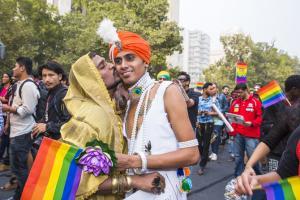
Representational image
Every year for the last few years in the month of February, thousands of people come together and celebrate LGBTQ pride by rallying the streets with rainbow colours and wishing for the society to accept them in every state of India as equals. LGBTQ pride is a platform where the community members can gather and celebrate their diversity.
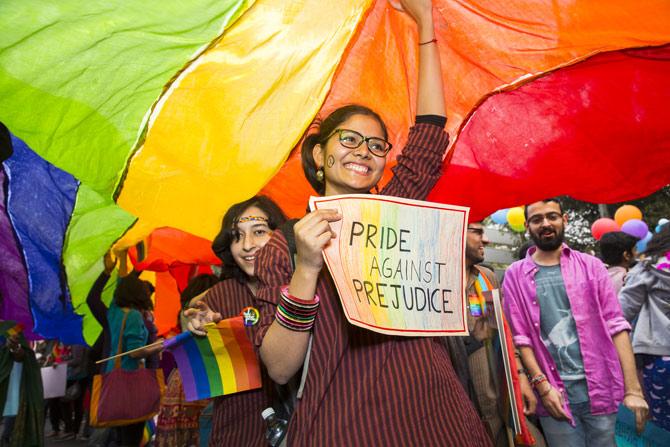
The first pride march was witnessed in Kolkata (then Calcutta) in 1999 and since then every year without fail the rainbow flags fly high to celebrate its achievements. It started with the intention to create awareness about the community but this year, it will be a celebration after the Supreme court decriminalized Section 377. "This is the 11th pride march and we have been organising it right from 2008- 2009. We have been having regular pride marches every year. Previously, we were fighting for equality, fighting so Section 377 is read down and then Section 377 was read down in 2009. We celebrated our existence and then we reached 2013, we again became illegal and now again we are legal. So its been a whole roller coaster of celebration," said Harish Iyer, an activist for a number of causes, including promoting the rights of the lesbian, gay, bisexual, and transgender (LGBTQ) community, children, women, animals, and survivors of child sexual abuse.
The word 'LGBTQ' still continues to stir controversies and be a taboo in India. For some, it’s a disorder and for others, it’s a psychological condition, but the question is what does LGBTQ stand for?
LGBTQ - What does it stand for?
The initialism LGBTQ stands for lesbian, gay, bisexual, transgender and transsexual and queer. The initialism has formed an umbrella term for the people who identify themselves under this sexuality and gender identity. They are also called the 'Rainbow Community' or the 'Queer Community'. The initialism also extends to LGBTQQIAA, which adds the other members of the community ie: Questioning, Intersex, Asexual and Allies. "Allies are the people who support the community irrespective of them being the members of the community. They are the people who support and stand for the community strongly providing support and standing by us. when we need to talk to anybody or need support, we know we can approach these allies in our life," informed Nishtha Nishant, a researcher. She also added explaining the other aspects of the community, "Questioning comprises of the people who are still not confined to a particular sexual orientation and are still questioning and taking time to decide. Asexuals are the people who lack sexual attraction to others."
Intersex people are born with any of several variations in sex characteristics including chromosomes, gonads, sex hormones, or genitals that, according to the UN Office of the High Commissioner for Human Rights, "do not fit the typical definitions for male or female bodies. When asked Nishta about the difference between a trans person and a eunuch she said, "All eunuchs are transgenders but not all transgenders are eunuchs. They (eunuchs) are born and raised in their specific community and follow the 'Guru-Chela' institution, but a transperson may have benefits of being in his/her family, education and employment." So this is why the LGBTQQIAA community is really diverse and colourful like the rainbow.
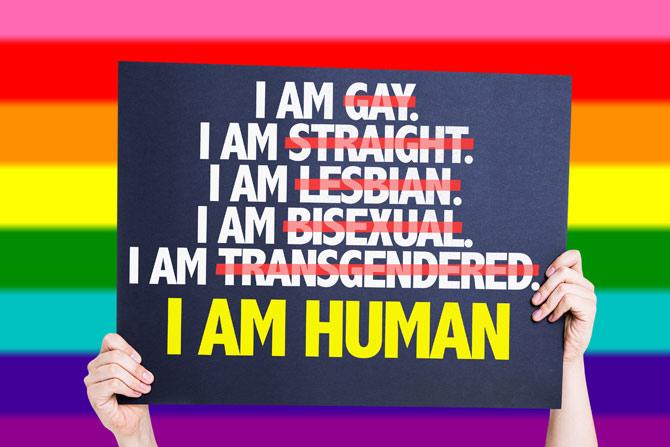
Representational Image
Existence
According to Youth Ki Awaaz, Homosexuality and Transgenders have their roots deep into our mythology.
Homosexuality in India is as old as our Vedas – Believe it or not!
According to a research conducted by the Gay and Lesbian Vaishnava Association (GALVA), it was around 3102 B.C. known as the Vedic Age, homosexuality or non-normative sexual identity was recognised as “Tritiya Prakriti”, also known as the third nature.
The Trans Community has its roots back in the Madurai's Temples
The third century BC witnessed the Koovagam festival which celebrated the story of Lord Krishna, who took the form of a woman to marry Aravan before the epic battle of Mahabharata. The festival continues even today in India and marks as the largest annual gathering of Trans people. "Hinduism has examples of homosexualities, whether it is Lord Ayyappa who is born to Shiva & Vishnu, who took Mohini avatar or whether it is Shikhandi who is an example of a trans person. If you look at all these examples like Ardhanareshwar in Hinduism, the speak about homosexuality," said Harish Iyer.
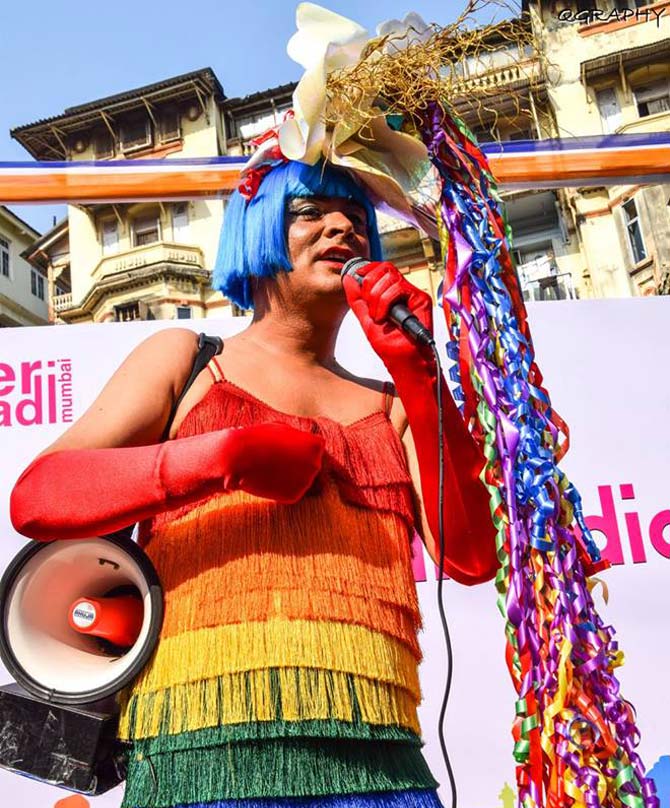
Pic courtesy / Facebook Harish Iyer
Queerness is all over our historic Temple walls – Our heritage
Temples built in Tanjore and Puri dated between the 6th and 14th centuries had some explicit illustrations of queer couples. So LGBTQ dates back to the historic era and was celebrated in India.
Rights and Laws
According to IAS SCORE, In 1994, eunuchs were legally granted voting rights as the third sex.
On 15 April 2014, the Supreme court of India declared members of the transgender community a socially and economically backward class entitled to reservations in education and jobs, and also directed union and state governments to frame welfare schemes for them.
On 24 April 2015, the Rajya Sabha unanimously passed the Rights of Transgender Persons Bill, 2014 guaranteeing rights and entitlements, reservations in education and jobs, legal aid, pensions, unemployment allowances and skill development for transgender people. It also contains provisions to prohibit discrimination in employment as well as prevent abuse, violence and exploitation of transgender people.
In April 2017, the Ministry of Drinking Water and Sanitation instructed states to allow transgender people to use the public toilet of their choice.
On 28 November 2017, N. Chandrababu Naidu, the Chief Minister of Andhra Pradesh, announced the enactment of pension plans for transgender people
On 6 September 2018, the Supreme Court issued its verdict. The Court unanimously ruled that Section 377 is unconstitutional as it infringed on the fundamental rights of autonomy, intimacy and identity, thus legalising homosexuality in India
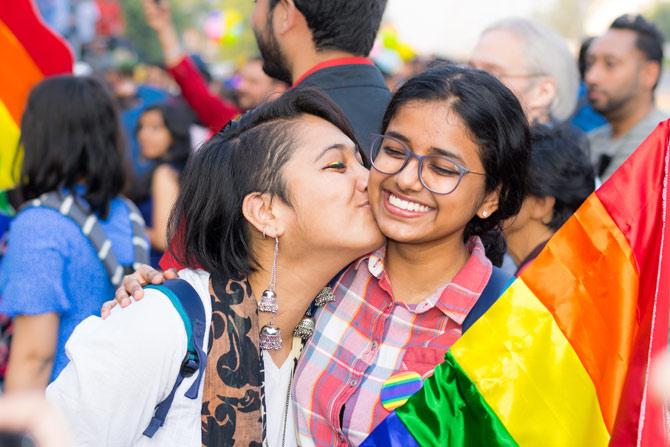
Representational Image
In late December 2018, MP Jagdambika Pal introduced a bill to the Indian Parliament to amend the Army Act, 1950, the Navy Act, 1957 and the Air Force Act, 1950 and allow LGBT people to serve in the Armed Forces.
Landmarks
Section 377
In 1862, Section 377 of the Indian Penal Code came into existence. It was drafted by Thomas Babington Macaulay, then head of the Law Commission. This section strongly criminalises any form of sexual activity “against the order of nature”, and can be used to harass and punish same-sex couples.
All-India Hijra Conference
In 1981, The All-India Hijra Conference was called and around 50,000 members of the community were organized in Agra.
Let’s talk about Queerness
Activist Arvind Narrain when still a student, started the first LGBTQ rights seminar in National Law School of Bangalore in 1997, opening gates to the discussion on queerness in a public forum for the first time.
Helpline for LGBTQ members
Two separate helplines and support networks were set up for LGBTQ Indians in crisis – Sangini, in New Delhi, for lesbians, bisexuals and transgender women, and, Humraz for queer men.
India’s Gay Magazine
In 1990, Ashok Row Kavi founded India’s first magazine for queer men called BombayDost.
First Pride march ever
In 1999, Calcutta embarks the first ever ‘Gay Pride Parade’ in India. It was called the Calcutta Rainbow Pride and had only 15 people participating yet it was a huge hit.
The Azaadi march in Mumbai
Mumbai saw its first ever pride parade in 2008. This parade was a huge hit and still continues to paint the city every year with its rainbow colours.
The fight against Section 377 begins
In 2001, Naz Foundation and The Lawyer’s Collective filed the first petition against Section 377, asking it to be eradicated n the grounds that it discriminated queer people, and also hampered HIV/AIDS intervention programmes.
The battle of equals’ begins
By 2004, the LGBTQ community was now organised and was ready to take the fight for their equal rights. After a long battle, success strikes the community when the Delhi High Court passes a landmark judgement on July 2, 2010, by reading down Section 377.
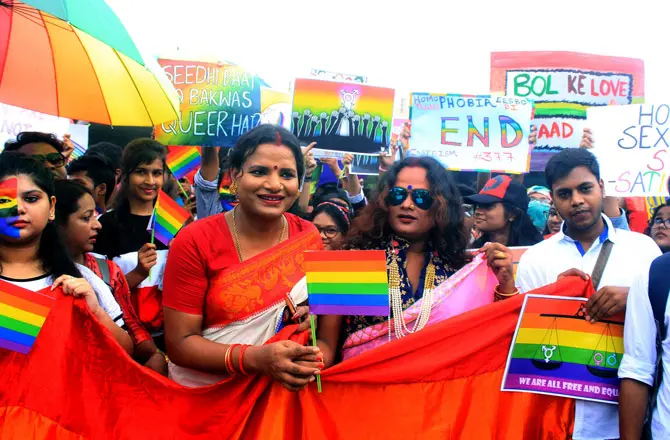
Representational Image
Recriminalising Homosexuality
In 2013, the Supreme Court overturned the Delhi High Court’s progressive judgement on Section 377 by recriminalising it again over India.
The emergence of the third gender on papers
In 2014 onwards, Delhi University started releasing admission forms that included the “third gender” category to open doors for trans students.
Love for all - Section 377 read down
In 2018, the supreme court's verdict read down Section 377 stating Consensual adult gay sex is not a crime and article 14 and 21 of Indian Constitution contradict the present view of Section 377.
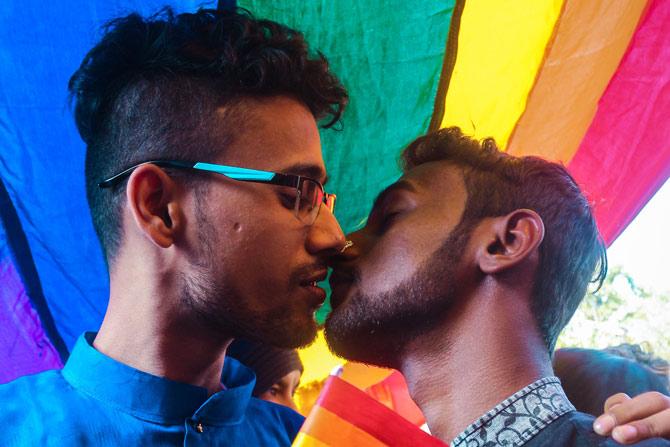
Representational Image
Achievements – the firsts in their fields
- India's first transgender college principal: Manabi Bandopadhyay
- First transgender mayor of Raigarh - Madhu Bai Kinnar
- First RJ of India - RJ Shilok
- First transgender National General Secretary of the All India Mahila Congress - Apsara Reddy
- India's first transgender to become a mom - Activist Gauri Sawant
- India's first transgender police officer - Prithika Yashini
- India's first transgender judge - Joyita Mondal
- India's first transgender lawyer- Sathyasri Sharmila
- India's first transgender person to contest elections - Mumtaz
- India's first transgender who became an MLA: Shabnam Mausi
- India's first transgender soldier: Shabi
- India's first transgender medical assistant: Jiya Das
This year, the LGBTQ Pride march will be held on February 2, 2019 at August Kranti Maidan. This Pride march is dedicated to the long fight against Section 377 and the celebration of the Section being read down. LGBTQ community is no more illegal in our country and this will be the witness to their struggles and success over the years to date.
(With inputs from Surbhi Sharma)
Catch up on all the latest Crime, National, International and Hatke news here. Also download the new mid-day Android and iOS apps to get latest updates
 Subscribe today by clicking the link and stay updated with the latest news!" Click here!
Subscribe today by clicking the link and stay updated with the latest news!" Click here!






